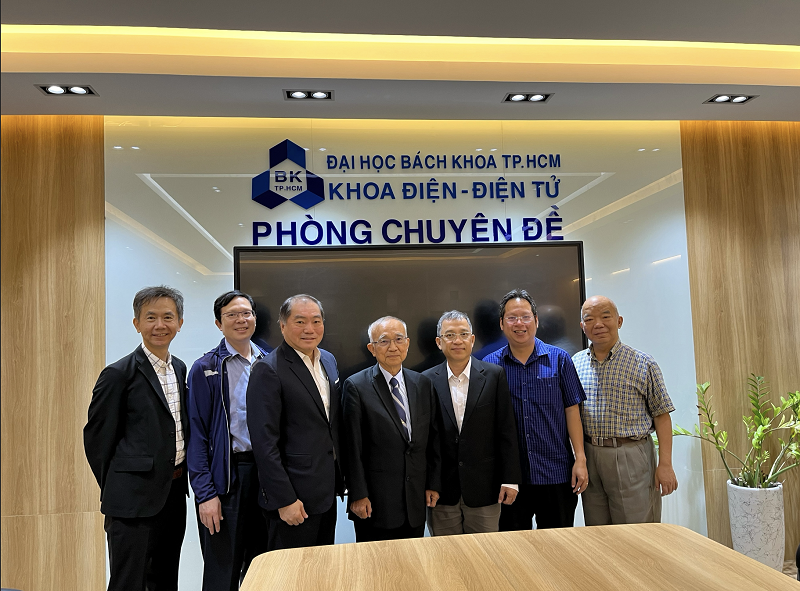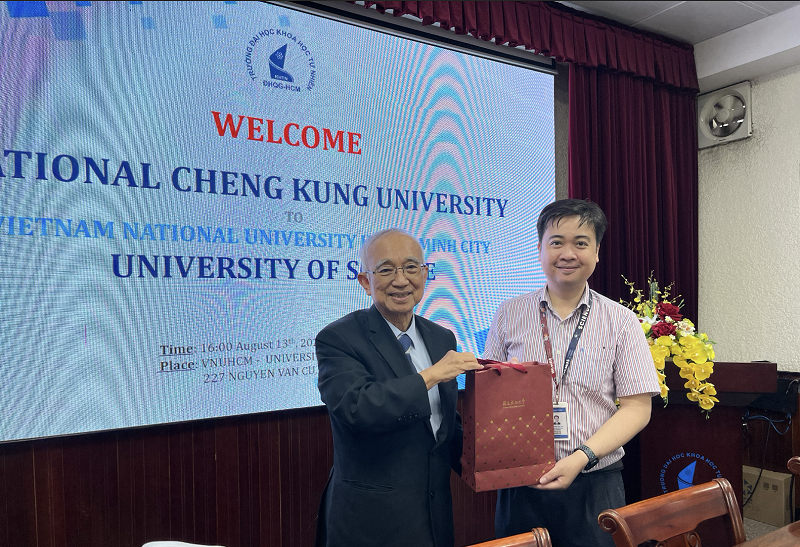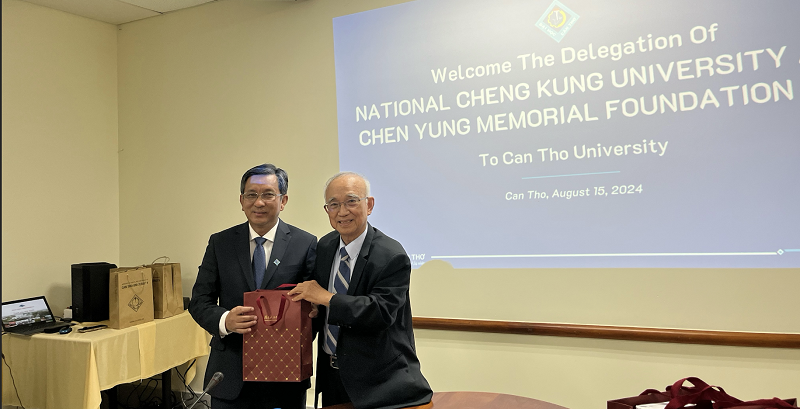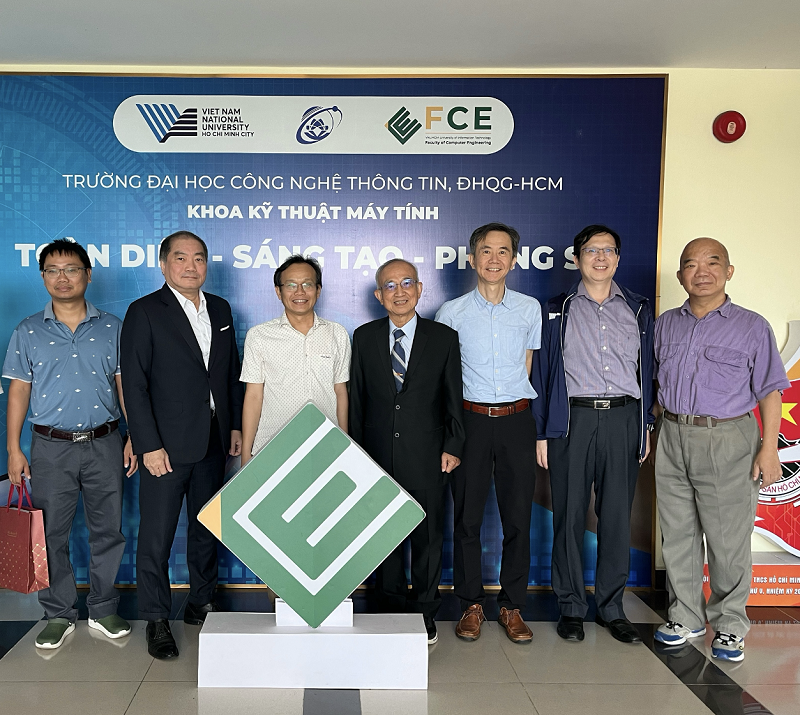NCKU AISSM Connects with Vietnam: Joint Hands with VNU-HCMC for Talent Cultivation on Chip Design and Packaging
Written by Amy Lin. Image credit to NCKU Academy of Innovative Semiconductor and Sustainable Manufacturing

NCKU representatives met with members of the Faculty of Electrical and Electronics Engineering at HCM University of Technology to discuss collaboration on chip design laboratories and curriculum.
The Academy of Innovative Semiconductor and Sustainable Manufacturing of National Cheng Kung University (NCKU AISSM) has embarked on an international collaboration with Vietnam National University, Ho Chi Minh City (VNU-HCMC) to establish a joint program for chip and packaging talent cultivation. This strategic partnership comes as the number of Vietnamese student enrollment at NCKU consistently ranks third among international student populations, reflecting the burgeoning potential linked to Vietnam's aggressive pursuit of semiconductor industry development, particularly in chip design.
From August 13 to 15, Dean Yan-Kuin Su of NCKU AISSM led a delegation to Vietnam, visiting Ho Chi Minh City and Can Tho, the country's fifth-largest city. Both locations are renowned for their abundance of young talent and high-quality science and engineering institutions. The delegation visited three member institutions of VNU-HCMC, the University of Science, the University of Technology, and the University of Information Technology, and traveled south to Can Tho University, located in the heart of the Mekong Delta. Throughout their visit, the NCKU representatives engaged in productive discussions with faculty heads and professors from departments of Electrical Engineering, Communications, and Power Engineering. The focal point of these dialogues was the exploration of collaborative talent cultivation programs, specifically targeting two critical segments of the semiconductor industry chain: chip design and packaging. These meetings resulted in a consensus on potential cooperation strategies, laying a solid foundation for future collaborations.
VNU-HCMC member institutions, University of Science, University of Technology, and University of Information Technology, have a combined student population of approximately 53,000, with Electrical Engineering, Information Technology, and Computer Science constituting the largest disciplines. Undergraduate students comprise 90-97% of the student body. Can Tho University, situated in the agriculturally rich Mekong Delta, with its strong focus on agricultural and engineering studies, has a student population of around 42,000, with undergraduates accounting for about 95% of the total.

Associate Professor Tran Minh Triet, Vice President of the University of Science at VNU-HCMC (pictured right), has expressed strong support for collaboration with NCKU. As part of this partnership, the University of Science has selected and sent exceptional students to participate in NCKU AISSM Semiconductor Summer School program in 2024.
Both Ho Chi Minh City and Can Tho enjoy favorable policy environments and prime locations for infrastructure development. This visit, facilitated by Ho-Hsien Chen, Education Counselor at the Taipei Economic and Cultural Office in Ho Chi Minh City, enabled face-to-face meetings between Vietnamese academia and semiconductor professors from NCKU AISSM of NCKU among the top Taiwanese universities. In addition to Dean Yan-Kuin Su, the NCKU delegation included Director Professor Lih-Yih Chiou and Deputy Director Professor Shuenn-Yuh Lee of the IC Design Program, and Professor Shoou-Jinn Chang from the Semiconductor Manufacturing Technology Program.
Dean Yan-Kuin Su of AISSM has endorsed the strategic approach of Vietnamese universities in utilizing IC design as a gateway into the semiconductor industry. Dean Su acknowledged the merits of this strategy, citing its lower capital intensity and the opportunity to capitalize on intellectual talent concentration, deeming it both pragmatic and competitively advantageous. However, Dean Su cautioned that focusing solely on chip design training would result in knowledge gaps in semiconductor manufacturing processes, packaging, and testing methodologies. He emphasized the necessity of a more comprehensive educational approach that integrates these crucial aspects of the semiconductor supply chain.
Dean Su emphasized that AISSM's comprehensive approach, which encompasses five key technical domains of the semiconductor industry chain, IC design, semiconductor manufacturing, semiconductor packaging and testing, semiconductor materials, and smart and sustainable manufacturing. This holistic strategy aims to create seamless integration between different programs and their outcomes.
Since its establishment, NCKU AISSM has consistently offered intensive summer school programs for three consecutive years. This year, the focus was on hands-on chip design courses. Looking ahead to next year, AISSM plans to introduce new intensive courses covering semiconductor manufacturing processes and packaging technologies. These summer programs provide opportunities for students from Vietnam and other partner countries to have advanced studies in semiconductor technology at NCKU AISSM.

President Tran Trung Tinh of Can Tho University (pictured left) expressed enthusiasm for advancing opportunities for students and researchers in the semiconductor field to pursue academic and specialized training in Taiwan. Dean Yan-Kuin Su of NCKU AISSM is pictured on the right.
Director Lih-Yih Chiou of the Program on Integrated Circuit Design at NCKU Semiconductor Academy highly praised the Vietnamese students for their design concepts and practical skills. This summer, Director Chiou personally taught the digital chip design and layout course, where students from nine different countries participated. Remarkably, the only student who successfully tackled the most challenging specifications was from Vietnam. In the digital and analog chip design courses, 16 outstanding students were selected from NCKU's partner schools in Vietnam, including eight from the University of Technology and the University of Science at VNU-HCMC, all of whom demonstrated exceptional performance.
Taiwan ranks second globally in chip design output and first in annual semiconductor packaging and manufacturing output—a result of 50 years of government-driven collaboration between industry, academia, and research. Recognizing the urgent need for talent cultivation, NCKU Semiconductor Academy is at the forefront, focusing on training international high-level researchers to contribute to Taiwan's semiconductor industry.
During the meeting, Dr. Tran Trung Tinh, President of Can Tho University, expressed strong interest in sending seed researchers to NCKU for training. He also pledged to actively seek financial support to cover the costs for students to study in Taiwan. The goal is for these trained individuals to stay in Taiwan, gain experiences by working in semiconductor companies, and eventually return to Vietnam, similar to the trend seen in Taiwan in the 1980s. This would help Vietnam develop its chip design industry, boosting the economy and improving the quality of life for its people.

Faculty of Computer Engineering at the University of Information Technology at VNU-HCMC, has an international internship program planned for their undergraduate students in their eighth semester. This presents a potential opportunity for collaboration with NCKU, allowing students to pursue international internships.
Dean Su expressed his optimism, stating that NCKU Semiconductor Academy is eager to welcome talented students from Vietnam and other countries to study and conduct research in Taiwan, following the existing rules and regulations. He emphasized that Taiwan's semiconductor industry has established factories worldwide, and the local talent trained by Taiwanese universities are highly valued as key contributors by Taiwanese businesses operating abroad.
In May, 2024, NCKU signed a Memorandum of Understanding with VNU-HCMC. As part of this collaboration, students from VNU-HCMC participated in NCKU's semiconductor summer school, and three NCKU professors traveled to Vietnam to teach intensive summer courses at the University of Science (HCMUS) and the University of Social Sciences and Humanities (VNUHCM-USSH), both under VNU-HCMC. Additionally, on July 16, the President of Can Tho University led a delegation to visit NCKU, initiating discussions on collaborative exchanges in the fields of semiconductors and biomedical sciences between the two universities.
Looking ahead to next year, NCKU Semiconductor Academy will offer international students short-term intensive courses in both chip design and packaging as part of its summer school program. These courses will be complemented by a cultural immersion experience in the historic city of Tainan. The program is expected to attract students from NCKU's partner schools in Vietnam and other countries, fostering a dynamic environment for learning both the theoretical and practical aspects of semiconductor technology. This initiative will further deepen talent cultivation collaborations with VNU-HCMC and other research institutions around the world.
Provider:
NCKU News Center
Date:
2024-08-23
Click Num:
Share

